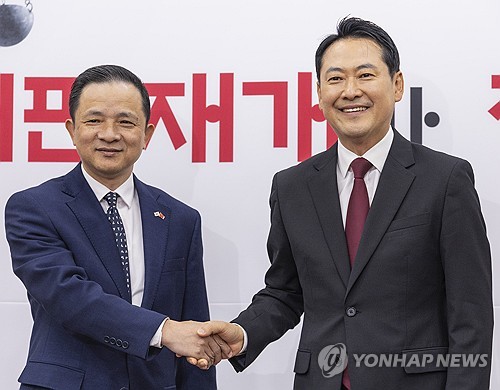
(Seoul=Yonhap Infomax) Da Ye On – Jang Dong-hyuk, leader of the People Power Party, emphasized that South Korea’s political and economic growth forms the foundation of the bilateral relationship with China, and is essential for the partnership to move in a positive direction.
During a meeting with Chinese Ambassador to South Korea, Dai Bing, at the National Assembly on the 21st, Jang stated, “Countries around the world, including South Korea and China, are facing a highly uncertain environment. Nations maintaining diplomatic ties with South Korea expect the country’s economic and political development to serve as a positive force for their own interests.”
He added, “The fundamental principle in Korea-China relations is that South Korea’s political and economic growth through its relationship with China should ultimately benefit both countries. This is the most desirable direction for our partnership.”
Jang further noted, “If South Korea fails to achieve economic growth, it will not be beneficial for either South Korea or China in the long term. The relationship should provide opportunities for both sides, and it is necessary to pursue mutual respect and cooperation to ensure a constructive partnership.”
Jang also referenced Chinese President Xi Jinping’s recent attendance at the Asia-Pacific Economic Cooperation (APEC) summit in Gyeongju, saying, “I am pleased that President Xi’s visit to Gyeongju and his successful schedule in South Korea have concluded positively.”
He continued, “As neighboring countries that cannot be separated, South Korea and China have experienced both challenges and positive developments throughout history. I hope you will continue to serve as a bridge to ensure more positive outcomes in the future.”
Ambassador Dai Bing stressed, “The two countries maintain close people-to-people exchanges, and strengthening bilateral cooperation best serves the interests of both sides.”
He added, “The decision to establish diplomatic relations between China and South Korea was made during the era of the Democratic Liberal Party, the predecessor of the People Power Party. In retrospect, this was a far-sighted decision with long-term vision.”
Ambassador Dai also remarked, “Recently, President Xi Jinping accepted the invitation to visit South Korea, attended the APEC summit, and the state visit was a complete success. This is helping to open a new chapter in China-Korea relations.”
He further commented, “Some countries do not wish to see the peaceful development of China-Korea relations, and some groups are unable to accept China’s peaceful rise and development,” indirectly criticizing those with a hostile or negative stance toward China.
Nevertheless, Dai emphasized his commitment to strengthening cooperation between the two countries. “We are entering an era of unprecedented change in a century, with global instability and the rise of protectionism and unilateralism. In this context, China and South Korea share broad and extensive common interests,” he said.
He concluded, “We will work together with the People Power Party and various sectors in South Korea to fully implement the shared understanding between President Xi Jinping and President Lee Jae-myung, and to actively advance the strategic cooperative partnership in a positive direction.”
dyon@yna.co.kr
(End)
Copyright © Yonhap Infomax Unauthorized reproduction and redistribution prohibited.

